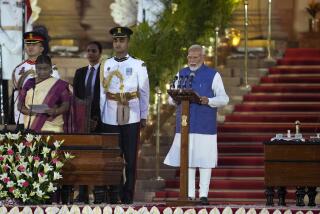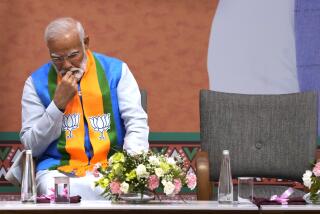India Gets 3rd Government in 3 Weeks
- Share via
NEW DELHI — India got its third government in three weeks Saturday, a motley alliance mirroring the great political and social transformations underway in this diverse land, where power is shifting slowly from higher castes to lower, from New Delhi to the outlying states.
H. D. Deve Gowda, 63, farmer’s-son-turned-politician and former chief minister of the southern state of Karnataka, was sworn in as prime minister along with a score of Cabinet members.
Seven members of the new Council of Ministers are from Bihar, India’s poorest state, and 10, including Gowda, are from the south.
The strong representation of minorities and Hindu lower castes and the fact that Gowda will be the first Indian prime minister who doesn’t speak fluent Hindi, the language of the once-dominant north, are additional signs of the changing times.
The fledgling government is the high-water mark of the gradual ascendancy of Hinduism’s so-called “untouchables” and “backward castes” and of regions that once were political backwaters.
Some political scientists have likened the process to the triumph of the emerging American frontier over the old East Coast aristocracies and the election of Andrew Jackson, the “people’s choice,” as U.S. president in 1828.
“If Deve Gowda is taking over as prime minister, that doesn’t mean the heavens have fallen. This rustic-looking man is more representative of India than city dwellers are,” said Ashis Nandy, director of the Center for the Study of Developing Societies, a New Delhi think tank.
After his swearing-in, Gowda, a member of the left-of-center Janata Dal Party, pledged that the market-driven economic reforms initiated five years ago by the long-ruling Congress (I) Party will continue.
But his shaky 13-party United Front coalition--which runs the gamut from Marxists to new parties founded by breakaway Congress Party members in Tamil Nadu and Madhya Pradesh states--has not yet been able to agree on key areas of policy.
What’s more, the alliance does not have a parliamentary majority by itself and must depend for its survival on the votes of Congress Party lawmakers.
Gowda, whose political career spans almost 3 1/2 decades, is a state-level politician and power broker who is untested on the national stage. He has never held governmental office in New Delhi.
Clad in a sarong and long shirt of plain white cotton, Gowda, who belongs to the middle-ranking Vokkaliga caste of farmers, took the oath of office from President Shankar Dayal Sharma.
Gowda was a dark-horse winner in his coalition’s search for a prime ministerial candidate. On Tuesday, the way was cleared for Gowda when short-lived Prime Minister Atal Behari Vajpayee of the Hindu nationalist Bharatiya Janata Party resigned after failing to forge a parliamentary majority.
The BJP was the top vote-getter in the recent election that led to the resignation of Congress Prime Minister P. V. Narasimha Rao on May 10. But neither the BJP nor any of its foes emerged with a working majority.
At his first news conference as prime minister, Gowda acknowledged that in his unstable coalition, details of the role foreign capital will be allowed to play in India’s formerly closed economy are still being worked out, along with foreign and industrial policies.
Gowda’s remarks hinted at a populist streak in pending policies. He said the countryside--where almost three-quarters of India’s 920 million people live but where five years of reforms have had little effect--will be a priority, with the goals of developing social services and agriculture.
Gowda said he will ask for a parliamentary vote of confidence in his government on June 10, and he predicted that it will run the full five-year term. But as Vajpayee prepared to hand over power, he said the Parliament is so hopelessly gridlocked that there will have to be new elections soon.
A distinguishing mark of Gowda’s government is the role of regional parties in forming a coalition that will set policy for all of India.
“There has been an unprecedented rise of the regional parties,” said Sudhir Hindwan, a scholar at the Center for Policy Research in New Delhi. “Certain groups are holding power for the first time.”
The United Front government may not last. But many political scientists believe that the trends it incarnates will continue. “Upper-class society is feeling threatened by the emergence of the lower castes. But this is the majority, and no one can ignore it,” Hindwan said.
More to Read
Sign up for Essential California
The most important California stories and recommendations in your inbox every morning.
You may occasionally receive promotional content from the Los Angeles Times.













